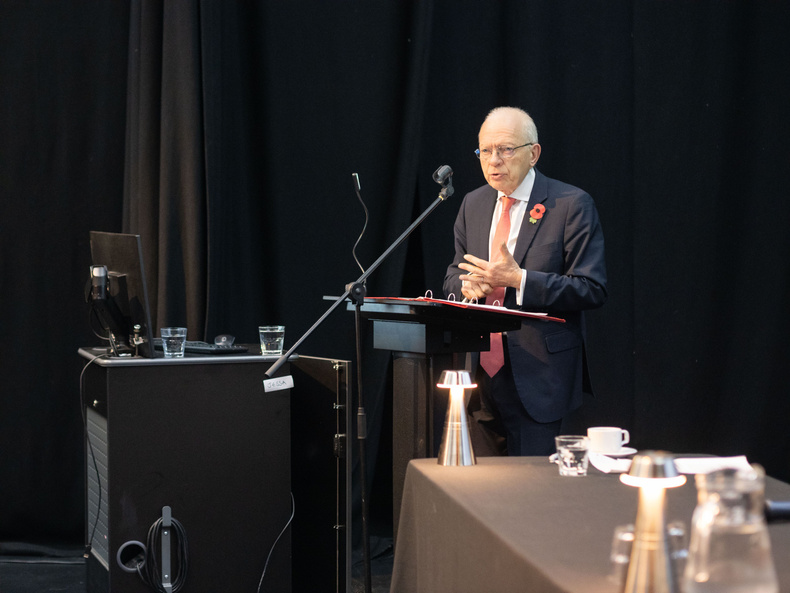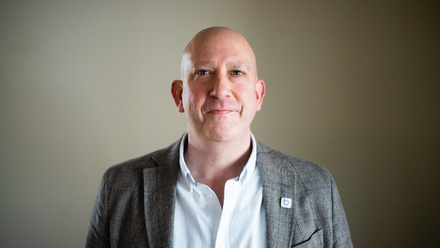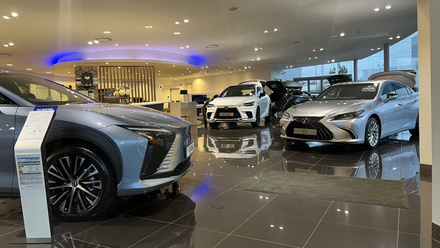UK poised to reclaim global leadership in low-carbon tech, says Lord Hunt at sustainability conference

“The UK has a great opportunity to reclaim global leadership by investing in low-carbon technologies, enhancing energy security and reducing reliance on fossil fuels,” said Rt Hon Lord Hunt of Kings Heath OBE, Minister of State, Department for Energy Security and Net Zero yesterday.
Lord Hunt (pictured) made these comments during the Sustainable Business Series Conference, organised by Greater Birmingham Chambers of Commerce (GBCC) at the Midland Arts Centre, with over 100 guests attending. It was hosted by GBCC director of external affairs Raj Kandola.
Lord Hunt, a keynote speaker at the conference, continued: “The invasion of Ukraine has highlighted our vulnerabilities, making the transition to homegrown renewable energy even more critical.
“To accelerate this transition, we have established Great British Energy with £8 billion of public funding to attract private investment and eliminate hurdles for major energy projects.
“We expect to see significant expansion in offshore wind over the next few years, as it is one of the fastest and most effective renewable energy sources. We have also lifted restrictions on onshore wind and are fast-tracking the development of solar energy.
“Nuclear energy will play an essential role as a stable baseload power source, complemented by gas with carbon capture, utilization, and storage for flexibility, while renewables will cover most of our energy demands.
“Ultimately, investing in infrastructure is vital for long-term growth and productivity. By enhancing our schools, hospitals, and roads, we can drive the economy forward while working towards a sustainable energy future."
Ed Cox, executive director for Strategy, Economy & Net Zero at the West Midlands Combined Authority (WMCA) was also a keynote speaker at the event.
He was speaking about the agenda of the WMCA on net zero and their plan to achieve net zero by 2041, saying: “The plan for West Midlands to achieve net zero starts from implementing four 5-year plans. The aim of the first year is to reduce our carbon emissions by a third.
“We are tackling this issue in many sectors, including transportation, domestic, commercial and grassroots.
“In transport, we aim to reduce private car journeys by a third, increase public transport trips to 20 per cent, and boost cycling and walking by 10 per cent.
“We're also committed to electrifying our bus and taxi fleets and investing £15 million annually to enhance active travel options.
“On the domestic front, we’re tackling retrofit challenges, setting a goal to upgrade 294,000 homes by 2026 on the way to a million by 2041.
“The West Midlands have been selected by the government as a retrofit pathfinder area, where we will be receiving a one-off grant.
“We are planning to use this grant to find the most cost-effective solutions. We are also in the process of addressing the supply chain issues and incentive gaps.
“For the commercial sector, we’re targeting energy efficiency improvements for 75,000 business properties by 2041, alongside pioneering zero-carbon construction hubs and regional climate adaptation plans.
“Reaching net zero will require collaboration across the region, with commuters, businesses, and increased devolution of powers all playing essential roles."
The event also held two panel discussion, focusing on sustainability and innovation. Meanwhile MAC deputy chief executive Nicola Rowe shared insights into the organisation's sustainability journey, highlighting the range of current exhibitions focused on climate urgency and the impact of waste.
The first panel discussion focused on breaking down barriers to sustainability, with the participation of Jessica Wilkes-Ball, head of sustainability & Net Zero at Mills & Reeve, Paul Warrington, relationship director at Lloyds SME Banking, and Rosa Wells, FE principal and dean for STEM, University College Birmingham.
Jessica emphasised the importance of constructive challenges, encouraging open, environmentally conscious discussions. She advocated for the autonomy and confidence to ask the right questions on sustainability matters.
Paul highlighted the sustainability opportunities available through Lloyds Bank, underscoring the impact of small actions that drive significant change.
He recommended involving employees interested in sustainability, regardless of their role, to build momentum within the business.
Rosa discussed the Sustainable Construction Skills Centre of the University College Birmingham, noting that courses are being designed to align with current sustainability needs. These courses aim to equip individuals entering the construction industry with skills for a sustainable future.
Another panel discussion was also held on the role of sustainability in innovation.
Fiona Rouse, director of PI-KEM Group and president of Lichfield and Tamworth Chamber of Commerce, emphasised the importance of scaling up the business as part of PI-KEM’s journey. Ralph Dodd, senior manager at PwC, discussed how the professional services giant is helping firms to navigate regulatory pressures related to sustainability.
Venetia Hulse, Accelerator Programme team lead at Connected Places Catapult, highlighted the significance of collaboration among businesses in addressing challenges, noting that working together is often more effective than tackling issues in isolation.
The Sustainable Business Series is sponsored by LLoyds Bank and University College Birmingham business school



